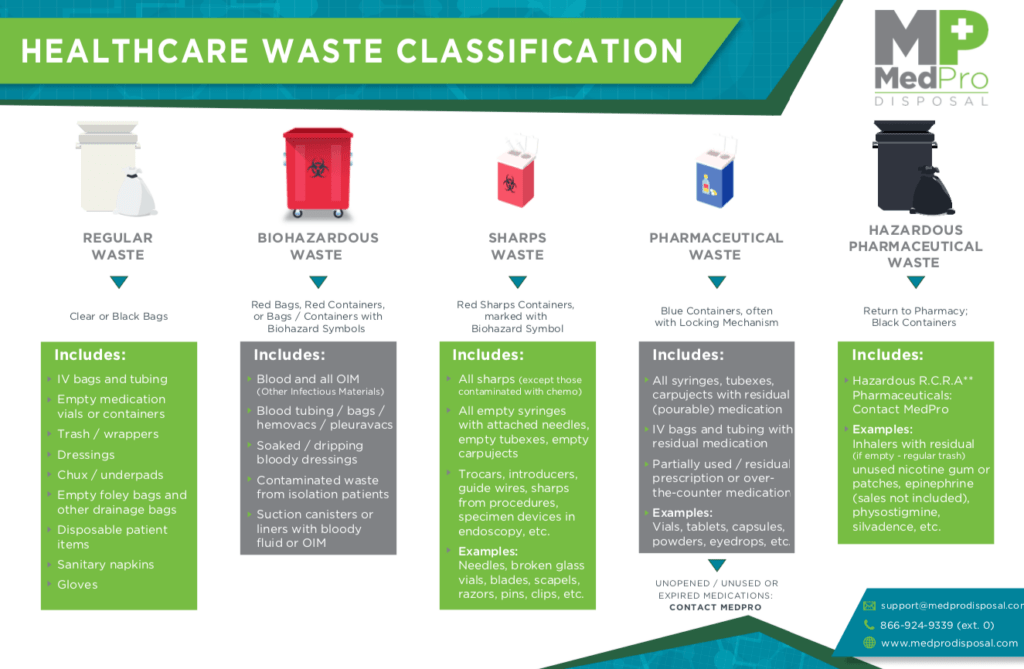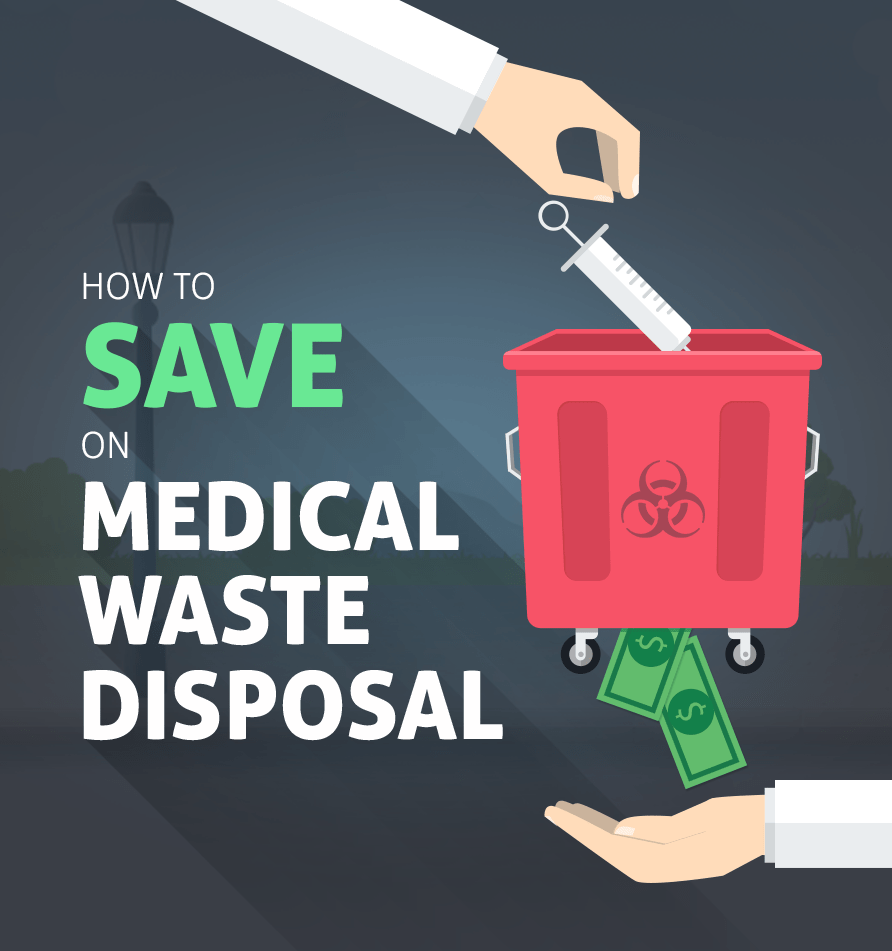Effective and Accountable Medical Waste Removal: Protecting People and the Planet
Wiki Article
Making Sure Safe Handling and Disposal of Medical Waste
Ensuring risk-free handling and disposal of clinical waste is of paramount value in medical care setups. Improper administration of clinical waste can position considerable dangers to the environment, public health, and health care workers. This requires adherence to rigorous standards and procedures for its safe handling and disposal. In this intro, we will certainly explore the significance of proper medical waste monitoring, the threats connected with inappropriate handling and disposal, in addition to the guidelines and methods that can be carried out to guarantee its secure disposal. In addition, we will certainly review the significance of training and education for health care experts in order to keep a clean and safe medical care setting. By complying with these methods, we can effectively mitigate the potential hazards related to medical waste.Value of Proper Medical Waste Management
Proper clinical waste management is of utmost value in making certain the safety and wellness of healthcare professionals, clients, and the basic public. Medical waste describes any kind of waste created by medical care facilities throughout the diagnosis, treatment, or booster shot of human beings or animals. This waste can position major health threats if not taken care of and disposed of effectively.
Among the main reasons why appropriate medical waste monitoring is vital is to stop the spread of infectious diseases. Medical waste, such as made use of needles, contaminated dressings, and biological materials, can bring harmful virus. Otherwise managed and thrown away properly, these microorganisms can be sent to health care employees, people, waste handlers, and even the basic public, resulting in the prospective episode of illness.
In addition, appropriate medical waste management assists shield the atmosphere - medical waste disposal. Medical waste contains dangerous materials, consisting of chemicals, pharmaceuticals, and radioactive materials. When not managed appropriately, these substances can pollute dirt, water bodies, and the air, presenting a significant risk to ecosystems and public health
Furthermore, reliable medical waste administration guarantees compliance with global standards and local regulations. Federal governments and regulatory bodies have developed procedures and guidelines to guarantee the safe handling, storage, transport, and disposal of clinical waste. Sticking to these laws is necessary to prevent legal consequences and preserve the track record and trustworthiness of medical care facilities.
Threats of Improper Handling and Disposal

If medical waste is not properly disposed of,Clients can likewise be revealed to these contagious diseases. If infected needles or various other sharps are not disposed of in designated puncture-proof containers, they may inadvertently puncture individuals, leading to possible infections. Additionally, if medical waste is not set apart appropriately, there is a threat of cross-contamination in between various kinds of waste, further enhancing the possibilities of disease transmission.
Improper disposal of medical waste can also have harmful results on the setting and the general public. If medical waste is not treated and dealt with appropriately, it can infect water sources, dirt, and air, resulting in the spread of contaminants and illness. This can have lasting repercussions on ecological communities and public health and wellness.
Guidelines for Safe Handling of Medical Waste
Applying reliable procedures for the risk-free handling of clinical waste is necessary in ensuring the protection of healthcare experts, patients, and the public. These standards are important in decreasing the threats related to the handling and disposal of clinical waste, such as infections, injuries, and ecological contamination.First and primary, health care centers should establish a detailed waste monitoring strategy that sticks to neighborhood, national, and worldwide regulations. This strategy needs to include clear instructions on waste segregation, product packaging, labeling, storage, and transport. It is essential to separate various kinds of waste, such as sharps, infectious products, drugs, and non-hazardous waste, to stop cross-contamination and advertise secure disposal.
Furthermore, health care employees must receive complete training on correct waste handling methods. They should be enlightened on the potential risks of clinical waste, the appropriate use personal safety devices (PPE), and the appropriate procedures for dealing with, carrying, and dealing with different types of waste.
Moreover, medical care facilities must routinely check and audit their waste administration methods to make certain conformity with guidelines. This includes carrying out normal evaluations, reviewing waste handling procedures, and providing feedback and training to employee.
Effective Strategies for Waste Disposal
To make sure the risk-free handling and disposal of clinical waste, it is important to use effective approaches for waste disposal. Medical waste can posture considerable risks to public health and wellness and the setting if not handled and thrown away appropriately. Medical care facilities and waste administration companies have to carry out appropriate strategies to minimize these dangers.One efficient strategy for garbage disposal is segregation. It entails separating different sorts of medical waste based on their qualities. Segregation permits for the appropriate therapy and disposal of each waste category, lowering the capacity for contamination or harm. Health care facilities must provide clear standards and training to personnel members on how to set apart waste properly.

Furthermore, healthcare centers must work together with licensed waste monitoring business to guarantee proper disposal of medical waste. These companies have the experience and tools called for to securely dispose and take care of of clinical waste in compliance with regulations and best methods.
Training and Education And Learning for Medical Care Professionals
Medical care specialists play a crucial duty in guaranteeing the risk-free handling and disposal of medical waste through extensive training and education and learning. It is important for health care companies to have a deep understanding of the prospective threats connected with clinical waste and the appropriate protocols for its administration. By receiving proper training, health care professionals can decrease the possible transmission of transmittable illness, protect against environmental contamination, and shield both themselves and the public.
In addition, training programs should emphasize making use of personal safety devices (PPE) and appropriate hand health methods when taking care of medical waste. medical waste removal service. Healthcare experts need to understand just how to properly get rid of and use of PPE to shield themselves from possible exposure to unsafe materials. They ought to additionally be educated on the relevance of routine handwashing and the appropriate usage of hand sanitizers to lessen the spread of contagious conditions
Proceeding education and normal updates on medical waste administration techniques are vital for medical care experts. As guidelines and laws develop, it is vital to maintain healthcare service providers educated about any changes in methods and best methods. This will certainly ensure that they stay updated and keep a high standard of safety in managing and disposing of clinical waste.
Verdict
In conclusion, proper handling and disposal of clinical waste is essential to make sure the safety and security of health care professionals, clients, and the setting. By sticking to these methods, we can reduce the potential threats associated with clinical waste.Medical waste refers to any waste produced by healthcare centers during the diagnosis, treatment, or immunization of animals or human beings. If clinical waste is not segregated correctly, there is a threat of cross-contamination in between various kinds of waste, additional boosting the opportunities of condition transmission.
It is essential to separate various kinds of waste, such as sharps, contagious materials, pharmaceuticals, and non-hazardous waste, to protect against cross-contamination and advertise safe disposal. WasteX Medical Waste Disposal.
To guarantee the risk-free handling and disposal of clinical waste, it is crucial to utilize efficient approaches for waste disposal. In addition, healthcare centers ought to establish a routine waste collection and transport timetable to stop waste buildup and minimize the danger of crashes or contamination.
Report this wiki page